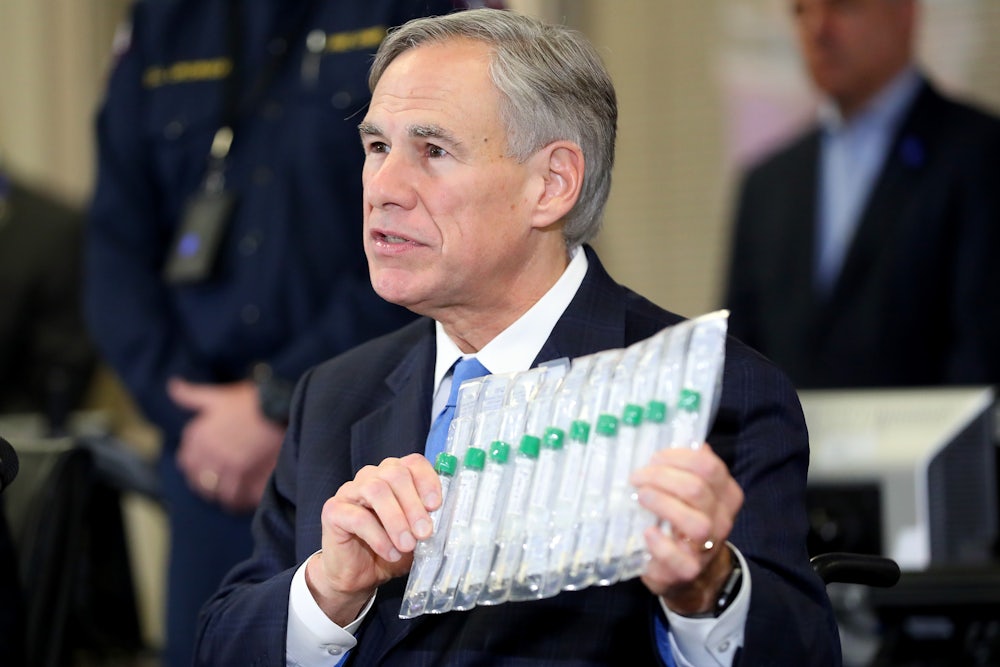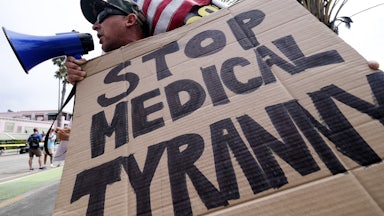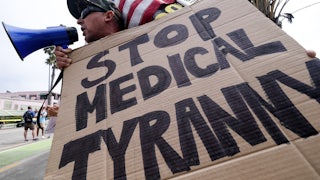The good news about Texas Governor Greg Abbott’s decision to take a stab at banning all Covid-19 vaccine mandates in his state is that it’s unlikely to work—at least not particularly well. Abbott may have issued an executive order that seeks to block any “entity” in Texas from making vaccination a condition of employment—a response to an executive order from President Biden requiring companies with more than 100 employees to mandate vaccination—but large corporations in the state, such as IBM and Southwest Airlines, have reacted with a shrug. A representative from American Airlines, headquartered in Fort Worth, issued a statement saying that “federal action supersedes” any such effort at the state level.
But Abbott’s executive order is also the latest, and arguably most significant, step in the GOP’s growing war against vaccine mandates and Covid-19 mitigation. It is pure tribal politics: more pandering to a GOP base that has already embraced extreme vaccine skepticism to its detriment, thanks in large part to prodding from right-wing political and media elites. It is also designed to sow doubt and confusion—Tucker Carlson’s nightly screeds against the mandate and, often, the vaccine itself are good examples—which has potentially deadly consequences. Republicans, having made resistance to any and all Democratic policies the centerpiece of their political and policy agenda, are now actively supporting measures that could get their own voters killed.
From a political perspective, Abbott’s executive order reflects the fact Republicans now only pander to the blood-red portion of their base: Lose the fringes, their thinking goes, and you’ll quickly lose your stature in the conservative movement, if not your job. But this resistance, however performative, may also be bad politics: Vaccine mandates remain broadly popular. For Democrats, as well as the Biden administration, Abbott’s ill-advised move creates an opportunity to regain traction in the battle against the pandemic—both in the practical sense and the political.
Biden’s popularity has plummeted in recent months. There are many potential factors in play, some of which the president and his party must own—the chaotic scramble to leave Afghanistan, ongoing supply chain disruptions, and the pathological inability of congressional Democrats to simply get shit done are among them—but Covid-19’s continued, and in some parts of the country growing, presence has played the most important role in his declining standing among voters. The central premise of Biden’s presidential campaign was that he could reassert competence at the White House and bring the country out of the dark days of the pandemic.
The highly contagious delta variant and the massive resistance to the vaccine on the right are the primary reasons why Covid-19 continues to ravage large swathes of the country, but the Biden administration is nevertheless taking the blame, in part because Biden himself claimed the country was on the verge of declaring “independence” from the virus in July.
Democrats have struggled to regain control of the narrative, in part because they have spent most of the summer griping over a bill that has little to do with the pandemic, at least not directly. The Build Back Better Act and its accompanying infrastructure bill were designed for a post-Covid world that hasn’t yet materialized; as such, Democrats and the Biden administration have struggled to communicate that they really are taking fighting the virus seriously.
The war on mandates is the clearest evidence yet of the GOP’s role in keeping the ongoing pandemic at a boil. But the public favors the mandates. A September Politico/Morning Consult poll found that nearly 60 percent of voters supported them, although they had only 33 percent support among Republicans. Still, this is a fairly clear-cut instance of public opinion creating a favorable environment for Democrats: The public is on board, and what resistance does exist is limited to a mere slice of the electorate (and also Kyrie Irving). There is, moreover, an added dimension: Republican opposition to the Covid-19 vaccine has also led to a significant uptick in resistance to all vaccines, creating a much larger public health crisis.
It is perhaps incorrect to refer to it as a “vaccine mandate.” The Biden administration’s policy has loopholes—it only applies to companies with more than 100 employees, and unvaccinated workers can keep their jobs if they submit to weekly Covid-19 tests. While some workers have lost jobs as a result of vaccine mandates handed down by their employers, those numbers are also very small: When Houston’s Methodist Hospital required vaccines, only 150 out of more than 25,000 workers were ultimately terminated. Still, with only 56.6 percent of the country vaccinated, per recent data from the Centers for Disease Control and Prevention, and with 46 percent of unvaccinated Americans saying they “definitely” won’t receive a dose, according to an August poll, such measures are increasingly necessary to control the pandemic and to protect against future variants.
Democrats have thus far struggled to make the case that Republicans bear proportional blame for the ongoing pandemic, but the divide over mandates neatly illustrates the case. On one side, you have public health efforts being undertaken to get people vaccinated; on the other, you have efforts that are actively perpetuating the crisis. As Republicans increasingly make opposition to mandates a plank of their 2022 midterm campaign, Democrats need to make full use of the fact that this is a losing issue for the GOP. Doing so would also be in keeping with Biden’s desire to rise above tribal politics. After all, Democrats are currently more willing to protect the lives and livelihoods of Republican voters than the Republican Party is willing to for its own.










